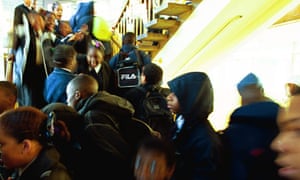Social connectedness and emotional wellbeing are intrinsically linked. On this basis, projects and programmes working with young migrants and refugees often aim to encourage their ‘integration’ through the provision of psychosocial support (PSS). The Horizon 2020 ‘RefugeesWellSchool’ (RWS) project implements and evaluates PSS programmes for migrants and refugees in secondary schools in the UK and Europe. In the UK, Professor Charles Watters and I conducted programmes in two schools as part of the RWS project: a ‘classroom drama workshop’ in a school in Inner East London, and the ‘Peer Integration and Enhancement Resource’ (‘PIER’) in a school in Brighton & Hove. My doctoral research on the project used ethnographic methods to explore a) the differences that mattered in young people’s peer relationships; b) if and in what ways, if any, these differences were bridged in moments of ‘encounter’ among peers; and c) how peer relations of difference or encounter were influenced by various factors, including educational policies and practices and the RWS project and its UK programmes, which I discuss here.

In the ‘superdiverse’ context of the Inner East London school (Vertovec, 2007), students treated national or ethnic differences as ‘commonplace’ (Wessendorf, 2014). Students said that they appreciated the learning opportunities offered by the school’s diverse makeup, and I often observed them asking questions about each other’s religions, languages, or home countries. During the classroom drama workshop it became clear that the workshop’s focus on targeting cultural issues linked to immigration was largely irrelevant in this superdiverse context, since most students already had empathy for each other’s experiences of migration. Other identity issues were more important to them. One day after school I observed two Asian students joking with their teacher about not wearing Muslim dress in central London, as they didn’t want to be stereotyped as ‘bombers’. In having a dialogue with the students about this issue, the teacher encouraged them to critically reflect on their roles in and with the world (Freire, 1970). In addition, school policies and teacher practices mediated the involvement of a large number of students in gangs, influenced in part by socioeconomic deprivation. One teacher described this process as an ‘up-hill battle’; another commented that gangs ‘would always win’ unless structural inequalities were addressed.
Diversity was less commonplace in the Brighton & Hove school than in the East London school, and differences of nationality, ethnicity and religion played a bigger role in young people’s peer relationships. I observed one student being questioned by her peers in class about why she was wearing the hijab. She responded with frustration. In both schools, students often spoke with humour about differences with their peers; the line was sometimes unclear between playful ‘banter’ that aimed to bridge difference, and discrimination that aimed to cement it (Wise, 2016). Several newcomer students at the Brighton & Hove talked positively about receiving peer and teacher support when they first arrived in the UK. The school provides comprehensive English language support and runs a ‘young interpreters’ programme which supports students in welcoming newcomers. One White British student, however, told me that independence was important too in welcoming newcomers – if the school does everything for you, you won’t know how to do it yourself. His comments indicate the inherent paradox of ‘organising’ encounter, as ‘for encounters to happen something has to be left open’ (Wilson, 2017:612).

The 8-week PIER programme in the Brighton & Hove school aimed to encourage understanding of, and empathy for, the experiences of migrants and refugees. Several students said that the programme had helped them to step out of their comfort zones and to put themselves in others’ shoes. However, the narrative focus of the wider RWS project on ‘migrants’ and ‘refugees’ risked alienating some students by exoticising immigration (Hall, 1991). Some White British students seemed shy or embarrassed when introducing themselves as ‘just’ from Sussex. In the East London school, many students rejected the ‘migrant’ label outright, with one Nigerian-Spanish newcomer declaring ‘But I’m not a migrant!’ as he read the project consent form. Through their use of language, projects can discursively reinforce social divisions, or even create them (Bourdieu, 1991).
My findings challenge the assumption that national or ethnic categories are key (Wimmer and Schiller, 2002), indicating that other ‘differences’ also ‘make a difference’ in the lives of young migrants and their peers (Berg and Sigona, 2013:356). My research foregrounds young people’s agency in navigating differences through ‘convivial labour’ involving curiosity and humour (Wise, 2016; Wessendorf, 2020). I hope to provide ‘an account of a cultural politics that avoids banal optimism while holding on to the possibility of transcendence’ (Back, 1996:2). I found that schools and PSS programmes can encourage encounter across peer divisions, although their efforts are challenged by structural constraints such as socioeconomic deprivation. Schools and PSS programmes need to find the right balance in supporting young people’s peer relationships without ‘hand-holding’ or othering them in the process.
Emma is currently completing her doctoral thesis on the RefugeesWellSchool project at the University of Sussex. If you have any comments or questions on her research please do get in touch at e.soye@sussex.ac.uk
Works cited
Back, L. (1996) New Ethnicities and Urban Culture: Racisms and Multiculture in Young Lives. 1 edition, London: Routledge.
Berg, M. L. and Sigona, N. (2013) ‘Ethnography, diversity and urban space.’ Identities, 20(4) pp. 347–360.
Bourdieu, P. (1991) Language and symbolic power. Reprint, Cambridge: Polity Press.
Freire, P. (1970) Pedagogy of the Oppressed: 30th Anniversary Edition. Bloomsbury Publishing USA.
Hall, S. (1991) ‘Old and New Identities, Old and New Ethnicities.’ In King, A. D. (ed.) Culture, globalization and the world-system: contemporary conditions for the representation of identity. Basingstoke: Macmillan in association with Department of Art and Art History, State University of New York at Binghamton, pp. 41–68.
Vertovec, S. (2007) ‘Super-diversity and its implications.’ Ethnic and Racial Studies, 30(6) pp. 1024–1054.
Wessendorf, S. (2014) Commonplace Diversity: Social Relations in a Super-Diverse Context. UK: Palgrave Macmillan (Global Diversities).
Wessendorf, S. (2020) ‘Ethnic minorities’ reactions to newcomers in East London: Symbolic boundaries and convivial labor.’ The British Journal of Sociology, 71(2) pp. 208–220.
Wilson, H. F. (2017) ‘On the Paradox of “Organised” Encounter.’ Journal of Intercultural Studies. Routledge, 38(6) pp. 606–620.
Wimmer, A. and Schiller, N. G. (2002) ‘Methodological nationalism and the study of migration.’ European Journal of Sociology, 43(2).
Wise, A. (2016) ‘Convivial Labour and the “Joking Relationship”: Humour and Everyday Multiculturalism at Work.’ Journal of Intercultural Studies. Routledge, 37(5) pp. 481–500.


Leave a Reply